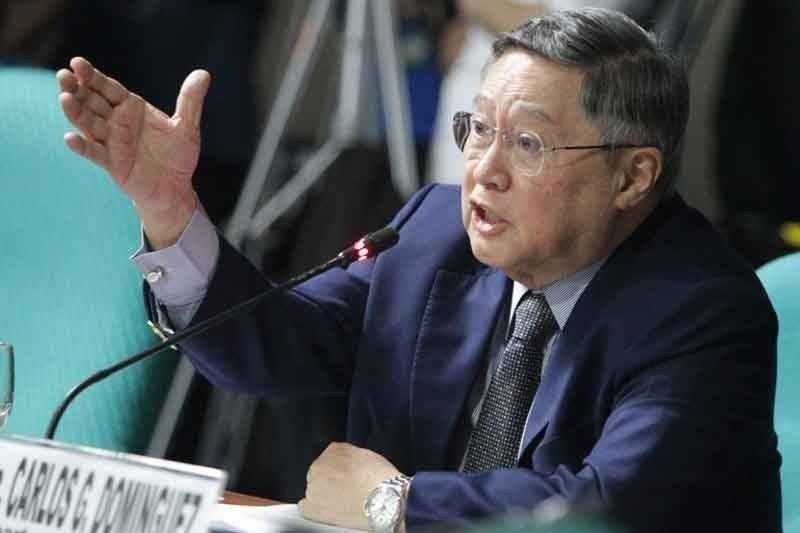'We have put a lot there': Dominguez defends fiscal response to outbreak

MANILA, Philippines — The Duterte administration has “put a lot” of resources on its coronavirus disease-2019 (COVID-19) response, the head of the government’s economic team said as he defended the government’s handling of the pandemic before senators on Tuesday.
“We are trying to appropriate whatever we have to support our most vulnerable members of our community,” Finance Secretary Carlos Dominguez III said in Senate briefing tackling the state’s response to the pandemic.
“We have really put a lot there,” he added.
At one point, the finance chief told Senate President Pro Tempore Ralph Recto, who was prodding Dominguez for a bigger fiscal outlay, to not “belittle” the government’s response to the outbreak which infected nearly 13,000 people nationwide. “I’m not belittling anything,” Recto responded.
The sufficiency of government resources became one of the focus of first of three-day marathon Senate hearings, which Senate President Tito Sotto said was meant to provide legislators information where the government is, and where it wants to go, on tackling the pandemic.
In his presentation, Dominguez reiterated a P1.74-trillion four-pillar economic strategy that the government has taken to fight COVID-19, a plan that came under scrutiny from Recto who wanted to “separate” actions taken by the central bank from the government’s actual fiscal spending.
As it is, the third pillar of the plan, worth P1.1 trillion, included the Bangko Sentral ng Pilipinas (BSP)’s measures to provide the government cash or ease interest rates and bank reserves to prompt higher lending. But Dominguez insisted the government had done more, telling Recto funding equivalent to 9.1% of economic output had been shelled out so far.
Funds for COVID-19 response have again taken center-stage in the past few days, from a government scramble to secure budget space for additional 5 million cash aid beneficiaries, to issues of mass testing that presidential spokesperson Harry Roque, at one point, said was better left to the private sector.
For Dominguez, and rest of the economic team, the problem really is the dwindling “budget cover” the government has to finance bigger spending, even while insisting cash is sufficient. As it is, while the Executive department was given power to reallocate funds through the Bayanihan to Heal as One Act, spending is not allowed to go beyond P4.1 trillion, a plan devised before the pandemic hit.
On top of it, the finance chief said “revenues have plummeted” due to lack of economic activity. Finance department data released after the Senate hearing showed January-April collections of the tax and customs bureaus down 25.4% and 7.3% year-on-year, respectively.
Less revenues meant more borrowings. “We are borrowing a lot of money. We have tapped our multilateral agencies. We have issued our single lowest bonds,” Dominguez said.
“We are not restricting in borrowing funds,” he added.
Supplemental budget not feasible
In Dominguez’ presentation, it showed the government has increased its reliance on official development assistance to fund the pandemic’s response. From the original plan of $5.7 billion, borrowings from the World Bank, Asian Development Bank and Asian Infrastructure Investment Bank were increased to $8.6 billion. It’s unclear how much of that had been secured to date.
Larger borrowings, as it appears, are not enough reason to ask for a supplemental budget. Echoing the budget department, Dominguez said the government is “constrained” to request Congress for additional outlay, as the central bank suggested, because there is no new revenue source as prescribed by the Constitution.
Earlier in the day, Finance Undersecretary Gil Beltran told Philstar.com it’s a “debate” whether the Charter requires only the presence of cash, or new revenues to open the gates for a new outlay. “In the past though, we requested based on new revenues,” he said by phone.
Dominguez agreed. “We do not have the required additional revenue to support an additional supplemental budget so we are living within our means.”
“We are trying to use the cash that we have in the most responsible way,” he added.
- Latest
- Trending































